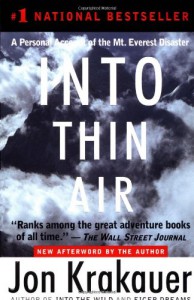 Several authors and editors I respect counseled me not to write the book as quickly as I did; they urged me to wait two or three years and put some distance between me and the expedition in order to gain some crucial perspective. Their advice was sound, but in the end I ignored it- mostly because what happened on the mountain was gnawing my guts out. I thought that writing the book might purge Everest from my life. It hasn’t of course.
Several authors and editors I respect counseled me not to write the book as quickly as I did; they urged me to wait two or three years and put some distance between me and the expedition in order to gain some crucial perspective. Their advice was sound, but in the end I ignored it- mostly because what happened on the mountain was gnawing my guts out. I thought that writing the book might purge Everest from my life. It hasn’t of course. But it is the way this reads, as Jon Krakauer, a client of Rob Hall’s, Adventure Consultants Guided Expedition, takes us step by brutal step up that mountain, in the spring of 1996. And back down again! Clearly the account of an anguished man desperately trying to make sense of it all, by telling it all. Not an easy task.
The Everest climb had rocked my life to its core, and it became desperately important for me to record the events in complete detail. The staggering unreliability of the human mind at high altitude made the research problematic. To avoid relying excessively on my own perceptions, I interviewed most of the protagonists at great length and on multiple occasions. When possible I also corroborated details with radio logs maintained by people at base camp, where clear thought wasn’t in such short supply.
Chances are I would not have read this were it not for my daughter’s unbridled enthusiasm in discussing it one Saturday morning when I was over for coffee. When I left that day Into Thin Air left with me. Hands down the greatest adventure, survivor story I have ever read. How could it not be? The author's visceral honesty in portraying his own part in this tragedy, took my breath away and lends undeniable,crediblity to this account.
The plain truth is that I knew better but went to Everest anyway. And in doing so I was party to the death of good people, which is something that is apt to remain on my conscience for a very long time.




